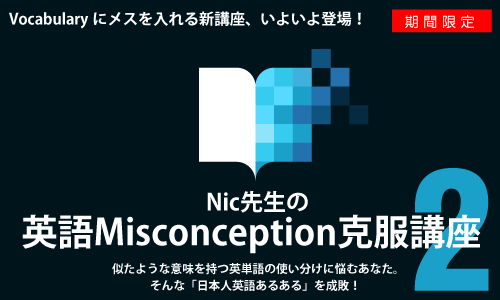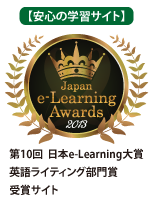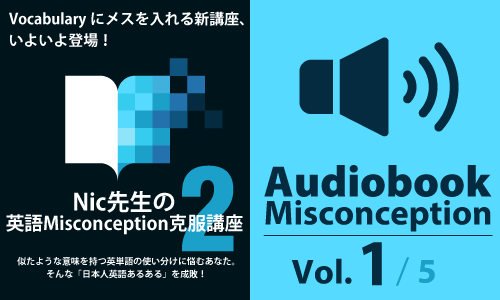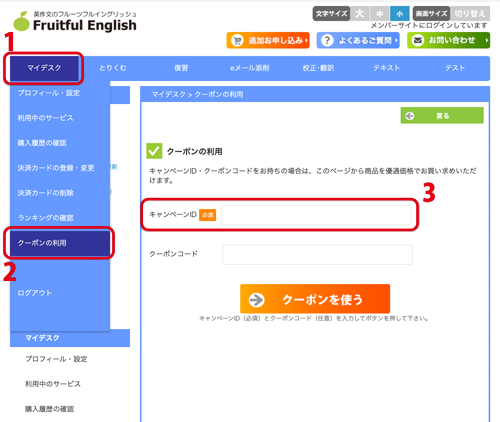


Nic�搶�̉p��Misconception�����u���Q
���̓��ʍu���̓���
�p��Misconception�����u������u������������Ɋw�ѐi�߂邽�߂̑��ҍu���ł��B
�w�юn�߂̒i�K�ł́A�p����p��Ŋw�K���邱�Ƃ͓����������܂��A��͂茾��͂��̌���Ŋw�K���邱�Ƃ���Ԃł��B
�ʂ̌���ɖĂ��܂����Ƃɂ���āA�ق�̏����ł����Ă������Ă��܂��j���A���X�⊴�o������܂��B���̏����ȃj���A���X�⊴�o�̈Ⴂ�������l�C�e�B�u�ƃm���l�C�e�B�u���Ă��܂��܂��B
���ɍ���̂悤�ȍ��܂Ŏg���Ă����p��̌���������u���ł̓l�C�e�B�u�Ɠ��{�l�̉p��ւ̈ӎ��⊴�o�̍��߂邱�Ƃ��d�v�ɂȂ��Ă��܂��B
�p��ʼnp����w�Ԃ��Ƃ͑傫�ȃ`�������W��������܂��A���̉p�ꃌ�x�����o���A�X�ɏ��ڎw�������Ƃ������̂��߂̏㋉�Ҍ����u���ƂȂ��Ă��܂��B
���̍u���Ŋw�ׂ邱��
- �����g���̊�{�I�Ȍ�b�ɂ��āA�������g���������ł���悤�ɂȂ�܂��B
- ���{�l�����ʂ��ĊԈႤ���@�ł̌���iMisconception)�ɂ��Đ������m����g�ɕt���܂��B
- ���탌�x���̐������P��^�p�͂����܂��B
- ���Ȃ����Ԉ���Ă��錾�t�̎g���������������Ă��炦�܂��B
- �u���e�L�X�g�����ׂĉp��̋��ނȂ̂ŁA�p��̓lj��X�s�[�h�����߂邱�Ƃ��ł��܂��B
�����悤�Ȍ��t�̎g�������ƁA
���{�l�����ʂ��ĊԈႦ��~�X���C������u���̑��ҁI
�hMisconception�h
Misconceptions happen all the time. Everyone makes them. They occur when we believe something to be true, but our belief or thinking is based on incorrect information!
For example, when I was a kid, I used to hate the water. I didn't like swimming, I hated taking baths or showers, and I would never, ever enjoy going to the beach. Then, something changed. I lived abroad, and discovered more of the world! Specifically, I did a research project in Australia, and I took up surfing. When I returned, and told them that I wanted to go to one of the famous beach areas near our house, they were shocked. I hate the beach. "Why would you want to go to the beach!" they said Well, this was a misconception of theirs. I returned from Australia a different person, and based on incorrect information that they held about me, they had a misconception of me! Don't let this happen to you!
As an English learner, you are in a great position. Some native speakers will make the errors you see in this course. It may surprise you, but even native speakers have misconceptions about their own language! However, they don't know it, and they will never change! Luckily, you can change. Since you're learning English �efresh', with no preconceptions, you can learn things the correct way! Even if you have misconceptions now, they are usually easy to fix. You just need to be shown the correct way.
Most importantly though, you need to have an open mind. Don't be afraid to ask questions, and don't be afraid to make mistakes. In fact, making mistakes, and asking questions about those mistakes is one of the best ways to learn. By engaging yourself in your errors, and actively trying to correct them, you can increase your ability to retain information.
Also, remember that learning English is about communication. You want to be able to communicate your ideas and your feelings to everyone, no matter where they are. However, you won't be able to do that if you make errors! You want to be able to communicate yourself, but you want to be accurate!
We live in a world where it's possible to communicate with people around the world. You can communicate with people from a huge variety of cultures, with their own customs, traditions and social values. So, it's even more important that you learn to communicate accurately. It's OK to make mistakes about other cultures. That's what happens when you experience something new! I can't count the number of times I've had misconceptions about countries, and then learned better after I visited them. People understand mistakes. However, you must be able to express yourself clearly. If you can communicate clearly, then you can explain your intentions!
In this course, we will focus on �ereal' English situations. We'll look at some of the most common English words there are, such as go and come, as well as words like very and so. We'll also look at making your writing more advanced, and working on common misconceptions that Japanese learners have about sentence structure.
I can't wait to teach you everything I know, and enable you to have great experiences in the world. We live on an amazing planet called Earth. Let me give you the tools to experience it!
Nic
��l�ŔY�܂Ȃ��ŁI�@������l�ɂ͕����Ȃ��p��̎g������
Nic�搶�̉p��Misconception�����u���̑��e�����ɂ���Ă��܂����I��������Misconception�u���Ƃ͂ǂ̂悤�ȍu���������̂ł��傤���H
Misconception�ɂ́u����E���Ⴂ�E�v���Ⴂ�E��F�v�Ƃ����Ӗ�������܂��B���̖��̒ʂ�AMisconception�u���ł͑����̕����p��ɑ��Ď����Ă������E��F��^���ʂ�����������邱�Ƃ�ړI�Ƃ����u���ł��B
Nic�搶�ƃt���[�c�t���C���O���b�V�������X�̓Y���ʂ��ďW�߂��u���{�l�̊Ԃł悭������ԈႢ�v�̒��ł���Ɏg���������o���ė~�����I�Ǝv�����̂����I���A����̍u���ł����Љ�Ă����܂��B
���M���X�Œ�o�����ۑ肪�A�߂��Ă���Ǝw�E���炯�ŗ������Ƃ����o���͂���܂��H���́A�����̉p��w�K�҂������ԈႢ�����Ă��܂��B
���{��Ƃ��������ʂ��ĉp�������Ă��܂��ƁA�ǂ����Ă��������ʂ�����p��\���Ƃ������̂��o�Ă��܂��B����͂��Ȃ��̕��s���ł͂Ȃ��A���ꂾ���g������������Ƃ������ƁB�C�𗎂Ƃ��Ȃ��ʼn������B���ʂ͋C����������Ȃ��̂ł�����A�A�A
�����A�Ԉ�����܂g�������Ă��܂����Ƃ����͔��������ł��ˁB�����ŁA���̍u����ʂ��Ă��Ȃ��������Ă���p��ւ̌����Nic�搶�ƈꏏ�Ƀ^�b�N�����Ă�����Ă��܂��܂��傤�I
�o���G�e�B�[�ɕx�e�[�}
Misconception�ƌ����Ă��A����Ȃ̌���Ȃ�����̂ł́H
����̍u���ł�Nic�搶�����i�̓Y��̒��ł悭����ԈႢ���܂Ƃߌ��I�������̂��Љ��Ă��܂��B����I�Ɏg����p��̒��ŕp�ɂɌ�����misconception�A�܂�N��������p��Œm���Ă����ׂ��e�[�}���肪���グ���Ă��܂��B
�Ⴆ�Awork��job�Anotice��realize�̎g����������肭�ł��Ȃ��Ƃ�������������Ⴂ�܂��H�u���{��ɖĂ��܂��Ƃǂ�����w�d���x�Ɓw�C�t���x�Ƃ����Ӗ������́A�ǂ���ł���������Ȃ��́H�v�Ǝv���Ă��܂��܂���ˁB
���Xthis/that/these/those/it�̈Ⴂ�͕����Â炢�̂ŁA������l�b�g�Œ��ׂ�����ǁA�ǂ����Ă��g����������肭�����Ȃ��B�J���}�ƃZ�~�R�����̈Ⴂ�͈�̉��I�Hif you have any questions��if you have some questions�̈Ⴂ�́H�ǂ�����������Ȃ�A���A�ǂ�����g�������́H���̂悤�ȉp��̎g�������œ�������Ă�����ɐ����u���Ē��������u���ł��B
�u�p��Misconception�����u���v�̎�u�҂̊F����̐���������A����͍X�Ƀo�[�W�����A�b�v���A����misconception������ɋ�̓I�ɐ�������Ă��܂��B��b���o���Ă��邯��ǁA�p�[�t�F�N�g�ȉp���ڎw�������Ƃ��������u���������̕��A���Q�����҂����Ă��܂��I
�p��Ŋw�ѐg�ɕt����A�l�C�e�B�u�̊��o
������e�L�X�g����w���܂őS�ĉp��ł��p�ӂ��Ă��܂��B�w�юn�߂̒i�K�ł́A�p����p��Ŋw�K���邱�Ƃ͓����������܂��A��͂茾��͂��̌���Ŋw�K���邱�Ƃ���Ԃł��B
�ʂ̌���ɖĂ��܂����Ƃɂ���āA�ق�̏����ł����Ă������Ă��܂��j���A���X�⊴�o������܂��B���̏����ȃj���A���X�⊴�o�̈Ⴂ�������l�C�e�B�u�ƃm���l�C�e�B�u���Ă��܂��܂��B
���ɍ���̂悤�Ȍ���������u���ł̓l�C�e�B�u�Ɠ��{�l�̉p��ւ̈ӎ��⊴�o�̍��߂邱�Ƃ��d�v�ɂȂ��Ă��܂��B�p��ʼnp����w�Ԃ��Ƃ͑傫�ȃ`�������W��������܂��A���̉p�ꃌ�x�����o���A�X�ɏ��ڎw�������Ƃ������̂��߂̏㋉�Ҍ����u���ƂȂ��Ă��܂��B
���̃y�[�W�̖`���ł��Љ���hMisconception�h����n�܂�p�����\���ɗ����ł���lj�͂��������ł�����̍u���̎�u���ł��郌�x���ɒB���Ă���ƌ����܂��B
���{�l�̓T�^�I�ȃ~�X���Ȃ����u��
���Ȃ��͉p��ł���ȃ~�X�����Ă��܂��H
���B�̌������A�قƂ�ǂ̉p�ꒆ�E�㋉�҂̖�������������@�́A����ȏ�A���@��P�����l�ŕ����鎖�ł͂���܂���B��l�ł͐g�ɂ��鎖������A�����悤�ȈӖ������P��̎g�������𗝉����鎖�ƁA�����̒��Ő������P���I�ׂ�悤�ɂ��邱�ƁA�����āA���܂ł̊w�Z��Ɗw�ŊԈ���Đg�ɂ��Ă��܂�������iMisconception)���������ł��B
- ���܂ŁAI have few friends. �Ƃ��AI have much to do today. �Ƃ����p����g���Ă��܂���ł������H�����̕\�����s���R���ƕ�����܂����H�킩��Ƃ�����Ȃ��H�������\���͂ǂ��Ȃ�ł��傤���H
- �u�`�ł���悤�ɂȂ����v�ƌ����������A���Ȃ葽���̓��{�l���Acome to be able to���g���܂��B�ł������Ǝ��R�ŊȒP�Ȍ�����������܂��B����́A���Ȃ��������m���Ă���\���ł��B�Ȃ̂ɁA�s���R�ȉp��\����I�Ԑl���������܂��B�悭���鋤�ʂ̊ԈႢ�́A���̏ꍇ�A�������Ȃ����m���Ă���ȒP�ȒP��Œu�������鎖���ł��܂��B�l�C�e�B�u�͓���P��͎g���Ă��܂���B
- �u�`���Ȃ��^�`������v�ƌ������A�K��I am wondering�`.�Ŏn�܂镶�͂��������܂��B�قƂ�ǂ̓��{�l���������������Ă��Ȃ��\���̈�ł��B���̕\���𐳂����g���ɂ͂����̔閧������܂��B��������������Ă��Ȃ��\�����A�ق�̏����̃R�c�Ő������Ȃ�܂��B�ɂ����Ƃ���܂ŗ��Ă��邠�Ȃ��̉p��́A���ƈ���Ŏ��R�ȕ\���ɕς��̂ł��B�ł����A���܂ł̋���Őg�ɂ��Ă�������������j��ł��܂��B�w�Ԃׂ��͐V�����P��╶�@�ł͂Ȃ��A���܂ŊԈႦ�Đg�ɂ��ė����m���𐳂����m���ɕς��鎖�ł��B����ɂ͂��������w�͂͂���܂���B����͈Ⴄ��I�ƃA�h�o�C�X�����炤�����ł��B���ꂾ���ŁA������x�ƌ����������A��Ⴂ�ȉp��ɂȂ�Ȃ��悤�ɂ��邱�Ƃ��ł��܂��B
- Nic�ɂ͓��{�l�̗F�B�����܂��B���ꂩ��Љ��ԈႢ��Nic�B�l�C�e�B�u���Ԃł�����Ƃ����L���l�ɂȂ��Ă���F�l�����܂��B�ނ͏�ɁA�u��Ђɍs���Ȃ��Ɓv�ƌ������A�uI have to go to my company.�v�ƌ����̂ł��B���S�ɂ��������\���ł��B��������̌�����������܂��������ł��𗧂̂͂��Ȃ��������m���Ă���P��ł��B�u�P��v�͕K�������̒��Ŋo���ĉ������B�����̕������{����P�F�P�ʼnp�邱�Ƃŕs���R�ȉp��������Ă��܂��B�p����p��Ŋw�Ԉ�Ԃ̃����b�g�́A���̊��o���w�ׂ鎖�ł��B���Ȃ��́A���̑����̕���������Ă���\�����A�P���D��x�̍������̂��珇�Ԃɉ��P���čs�����Ƃ��ł��܂��B�����Ď��̗F�B�̂悤�ɂȂ�Ȃ��ʼn������B
- I come there by train.�u�d�Ԃŗ��܂����v�Ƃ��A He went there by bike.�u���]�Ԃōs���܂����v�Ƃ����̂��ԈႢ�ł��B�l�C�e�B�u�͌����Ă���ȕ��ɂ͌����܂���B�����ԈႢ�Ȃ̂ł��傤���H���́A�������g�������������������ԈႢ�ł��B�ǂ����ē��{�l�̉p��͂���Ȃɖ�肪�����̂ł��傤���H���̍u���ł͓��Ɍ����������{����������{�I�ȃj���A���X��O��I�ɗ������Ă��炢�܂��B
- ���Ȃ��́u�l�v��\������Ƃ��A�ǂ̒��x�̕p�x��people��person���g���Ă��܂����H�����p�ɂɎg���Ă���Ȃ�A�������ׂ��ł͂���܂���I�@�ނ�l�C�e�B�u�͂��̒P������I�Ɏg�����͂���܂���B���{��Ō����u�l���v�Ƃ�����ۂɋ߂�����ł��B���{�l�́Apeople��person���g���߂��ł��B�햾����������ƁA�l�C�e�B�u�͂��̂悤�Ȏ��Ɏg���̂�anyone�Ȃ̂ł��B���̍u���ł́A���{�l���Ƃɂ�����Ⴂ�ȏꏊ�Ŏg�������ȒP����Asomeone,everyone, something, anywhere�Ȃǂ��g���āA�ǂ�TPO�ɍ������\���ɂ��邩�̃��[���������܂��B������u�����ǂ����ɍs�����I�v�ƌ������������A���{��́u�ǂ����v�Ɉ���������Let's go somewhere tomorrow.�Ȃ�Ă��������Ȃ��Ȃ�܂��B
- some��any�Ɋւ����p�́A���{�l���悭�ԈႤTop mistakes�̈�ł��BSome students in the class were confused. ���ԈႢ�ł��B�Ⴆ���̕��͂͂ǂ��������ׂ��Ȃ̂ł��傤���H ������l�Ŗc��ȕ������āA���ʂƂ��Đg�ɕt���̂��Ԉ�����p��Ȃ�A��������ȏ��l�ŕ�����͎̂��߂ĉ������B���Ȃ��̓��B�������X�e�[�W�́A���ɓƊw�ł͓���Ȃ��Ă��܂��B���x�����x�������ԈႢ���J��Ԃ��āA�悤�₭�A���������ȂƋC�������A���̍u���Ŏ��Ԃ��������ɁA�������A���Ȃ��̑O�ɂ͂Q�̑I����������܂��BNic�搶�ɂ�������ł��Ȃ��̉p���O��I�Ɍ������Ă��炢�܂��傤�B
- ���[���ɕq���߂��܂��H�@�{���̉p������낻��w�ԂƂ��ł��B���ʂ�������Ȃ����ł��A�p��������K�v������܂���ˁH����Ȏ�s/he�Ƃ�she/he�ƕ\�����Ă��܂��H
The student told his/her teacher the correct answer.
���k�����ƒ��ɓ��Ă��Đ搶�ɓ�����`���܂����B�m���ɐ搶�͈�l������Ahis/her�ɂȂ�̂ł����A�ł����ʂ�������Ȃ�������H����Ȏ��A�P���ł�they��their���g���̂������m�ł����H
�������p��́A���Ȃ������܂Œm��Ȃ�������������܂��A�Ȃ�ƁAThe student told their teacher the correct answer. �Ȃ̂ł��B�P���ł�their���g���̂������ł��B�ꌩ�w�Z�Ŋw�̂ƈႤ�p�ꂪ���̓X�^���_�[�h�B�̓_�ׂ̈����Ɋȗ������ꂽ�p��Ƃ͂����낻�댈�ʂ��鍠�ł��B�{���̉p��̔閧�������܂��傤�B - �p��㋉�҂Ǝ����Ƃ��ɔF�߂�ꂽ���Ȃ�A�����Ŋw�Ԃ��Ƃ͏d�v�ł��B���������@�m�������ł͒������Ȃ��ǂ������ɂ���܂��B���Ȃ��́AThis year, I will improve my English. �Ƃ��A Yesterday, I took my son/daughter to the park.�ƁA���Ԃ�\�����t���珑���n�߂Ă��܂��H���傤�Ǔ��{��ł������Ă���悤�ɁB���ꂱ�������̓��{�l�̉p��̓����ł��B
�Ȃ��A�l�C�e�B�u�̂悤�ɁAI will improve my English this year. �Ƃ��A I took my son/daughter to the park yesterday.�Ə����K�v������̂ł��傤���H����͂Ȃ��ł��傤���H�����Ă����ē��{�l�̏����悤�ɏ������͂ǂ̂悤�Ȏ��Ȃ̂ł��傤���H���͂̍\���A���Ԃɂ͂�͂藝�R������̂ł��B���̗��R���w��ʼn������B - ���Ȃ��͂���ȉp����g���Ă��܂��H
I'll show you the way to the train station.
Tell me the time you will arrive.
�l�C�e�B�u�͂��̂悤�Ȏ��A���Ε���(why��how)���g���܂��B�Ȃ̂ŁA���͂�
I'll show you how to get to the train station.
Tell me when you will arrive.
���̂悤�ɂȂ�܂��B���Ȃ��ɁA���Ε���how,why,when,wherever,whomever�Ȃǂ̐������g�����Ǝg���ׂ��ꏊ�������܂��̂ŁA����͂�萳�����\�����g�������ł��܂��B�����ƕ��@�����̑g�ݍ��킹�ł͂��ǂ蒅���Ȃ��l�C�e�B�u�Ɠ����p��\�����ł���悤�ɂ��܂��B - ���͂��\������߂̌ꏇ�ɂ��ăl�C�e�B�u���K�p���Ă���Q�̃��[�������Ȃ��̉p��Ɏ�����ĉ������B
I am going to the beach today, and I met my friend yesterday.�Ƃ������͂͂Ȃ��_���Ȃ̂�������܂����H���Ȃ��́A���̍u�����鎖�ŁA�߁i�O�㔼��2�̕��͂��Ȃ����̈ʒu�ł͂��߂Ȃ̂��H�Ȃ��J���}���K�v�Ȃ̂��A�������ڑ����̎g�����ȂǕ��͂Ɋւ��邷�ׂĂ��w�ђ������Ƃ��ł��܂��B - ���B�͏�ɓ��{�l�̉p��w�K�҂Ɏ�g�`���g���ȂƎw���������Ă��܂��B����قljp��ł͎�g�`���g���܂��A�g�����͂�������ꂽ���ł��B�ł����قƂ�ǂ̓��{�l�����{��̕\���̂܂܉p��ɂ�������Ǝv���Ă���̂ŁA���{�l�̉p��͎�g�`���炯�ł��B���{��ɂ͎�ꂪ�Ȃ��̂łǂ����Ă���g�������Ȃ�̂ł�قǒ��ӂ��Ȃ��Ƃ��̃~�X�ɂȂ���܂��B��g�`���g���ׂ��������^�C�~���O���w��ʼn������B
- �Ȃ������̓��{�l�w�K�҂͌��܂����悤�ɁA���������Ă��܂��̂ł��傤���H
It was the first time to travel for me to another country.
����Ӗ����@�̎����̂悤���Ɗ����܂��B�܂�ŁA���ꂪ���܂肫�����B��̌^���̂悤�ɁH�@���{�l�́Afor me, to me, ������I��we�̐������g���������m��Ȃ��悤�Ɏv���܂��B - ���{�l�͂Ȃ���it to�\����It that�\������D���ł��B
It was difficult for me �ƁAI thought it was difficult�͉����ǂ��Ⴂ�܂����H
�����āAEnglish is difficult for me. ���̍u���Ŋw�ׂA��������Ȃ������ȕ\�����x�Ƃ��Ȃ��ōς݂܂��BI find English difficult. �Ƃ��AI don't think English is difficult!�Ƃ����悤�Ƀl�C�e�B�u�����Ă���̂Ɠ����悤�ɁA���R�ɕ\���ł���悤�ɂȂ��ĉ������B���{�l�͏�ɉp��ɐG�����ɂȂ��̂ŁA������x���@�ʂ��當�͂�g��ł����K�v������܂����A�T�^�I�ȓ��{�l�̃~�X������郋�[����m�邱�ƂŃl�C�e�B�u�̂悤�ɕ\�����鎖�͂ł��܂��B
�p����p��Ŋw�ԃ����b�g
�p�ꂻ�̂��̂̃j���A���X�����ނ��Ƃ��o����
�u�ދ`��̃j���A���X������Ȃɂ��Ⴄ���Ƃ��͂�����m�邱�Ƃ��ł����͖̂{���ɂ��肪�����ł��B���̍u���̃e�L�X�g�ōł��ǂ��Ǝv���̂́A������p��ŏ�����Ă��邱�Ƃł��B�p��𗝉����邽�߂ɓ��{����g���Ă����̂ł͂��܂ł����Ă��p�ꂻ�̂��̂̃j���A���X�����ނ��Ƃ��ł��Ȃ��Ɗ����Ă��܂��B�p��Misconception�����u�b�N�͉p��ŏ�����Ă���̂ŁA���̃e�L�X�g��ǂ�ł���Ԃ͂ǂ��Ղ�Ɖp��̐��E�ɐZ���Ă��銴�o������܂��B����Ȋ��o�͏��߂Ăł��B�v
�i�����s�@N�DK�D����@55�@�j���j
���̐��ɑ�\�����悤�ɁA���{��Ő�������ƁA�ǂ����Ă��p��ł��������ł��Ȃ������ȃj���A���X�����������Ă��܂��܂��B���t�̎������ȈႢ����ې[���c��̂��A�����܂��ȓ��{��ł͂Ȃ��A�p����p��Ŋw�ׂ邩��ł��B
�p��̓��W�J���ɖ��m�ɐ�������̂����ɓ��ӂȌ��t�ł�����A���̓������������āA�����悤�Ȍ��t�̈Ⴂ�m�ɐ����ł��A���Ȃ��ɂ��[���̐��������͂��ł��܂��B�ł������̃����b�g����ɓ������̂́A�����܂ʼnp�������A�p�ꂪ������x�ǂݏ����ł�����Ɍ����܂��B
���̂��Ȃ��������̃A�h�o���e�[�W���������ĉ������B�قƂ�ǂ̉p�ꒆ�E�㋉�҂̖��͕��@�ł͂Ȃ��A�����悤�ȈӖ������P��̎g�������ł��B�����āA���܂ł̊w�Z��Ɗw�̕��ŊԈ���Đg�ɂ��Ă��܂�������iMisconception)���������ł��B
����Ԃ��A�ǎ��̉p���ɐG��邱�ƂŁA�����Ŏg����t���[�Y��������
�������p��Ő�������ۂ�Nic�搶�̉p��ł̐������@�ɌJ��Ԃ��G��鎖���ł��܂��B����ɂ��A���Ȃ��̒��ɁA�p��̉�H�������Âo���ė��܂��BNic�搶�̋��ނł́A�p�ꎩ�̂��w�Ԃ��Ƃ��ł��܂����A�p���ɐG��邱�Ǝ��̂��w�K�ɂȂ�܂��B���ނ̒��ɉ��x���J��Ԃ��o�ꂷ��t���[�Y�ɐG��邱�ƂŁA���Ȃ��̋L���ɂ́A���̂܂ɂ��A�������̕\�����A�悭����������̂���A�����̒��Ŏv���o����t���[�Y�ɁA�����Ďg����t���[�Y�ɕς���Ă��܂��B
�ǎ��ȉp��\���̕�ɂŊw�ׂ�
���̗��R�́ANic�搶�̕��Ղœǂ݈Ղ��A�p��w�K�Ҍ����̉p��\���ɂ���܂��BNic�搶�͍���A���{�l�̉p��w�K�Ҍ����ɁA���Ղȕ��͂ŋ��ނ������Ă��܂��B���Ղƌ����Ă��A���w�������̕��͂Ƃ����킯�ł͂���܂���B�����܂ł���l�����̕����ł���Ȃ���A�Z��������₷�����͂�͂��Ă���Ă��܂��B���͂���͉p��̑匴���ł�����܂��B�V���v���ɒZ���A������₷���`���鎖�͉p�ꂪ�ł��d�v������|�C���g�ł��B�����Nic�搶�̗ǎ��ȉp���́A�^�����ׂ����͂̃T���v���W�Ƃ������܂��B����Ԃ�Nic�搶�̕��͂ɐG��ĉp��̃��Y���ɐG��܂��傤�B���̒����A�ǂ�ȍ\���A�P����g���Ă���̂��H���ׂĂ����Ȃ����^�����ׂ��p���ł��B
���̍u���Ŋw��Misconception
��������͂��̍u����6�����Ԃ����Ċw�ׂ�T�v���͂��Ƃɂ��`�����܂��B���Ȃ����ꂽ�͈͂ł̏Љ�ł����A�ǂ̂悤�Ȏ����w�Ԃ̂���̗�������Ă��Љ�܂��B
�p��Misconception�����u�b�N Misconception2�@Vol.1
�p��Misconception�����u�b�N Misconception2�@Vol.1�́A�O�u���u�p��Misconception�����u���v�̕��K�̏�ƂȂ��Ă��܂��B���e�œ��ɋ�킵�Ă���������������ԈႢ�����ׂ����E��̓I�ɐ������Ă��܂��B��A�T���v���Ƃ��ė���Љ�Ă��܂��B
�Ⴆ�Anotice��realize�͋�ʂ̓o�b�`���ł����H
I noticed that you got a haircut.��I realized that you got a haircut.�͂ǂ��炪���R�ȕ\����������܂����H
For this volume, we first look at a few common misconceptions from Course 1 in more depth, that still tend to give people problems. Then, we look at some more general phrases that are confused! Here�fs 2 examples:
1. Although we look at realise in Misconception 1, it�fs also commonly confused with the verb notice.
Realise is similar to the verb understand that was also covered in Misconception 1. The difference between realise and notice though is that realise describes becoming aware, or gaining the understanding of something.
He realised his mistake after the teacher told him.
In this case, notice the change that the subject undergoes. That is, he didn�ft understand or become aware of his mistake immediately. Instead, it was only after the teacher that this change and gaining of understanding occurred. He didn�ft know he made a mistake before, but then he learned about his mistake and understood it after the teacher told him.
However, notice simply means to observe, or pay attention to something. Importantly, it implies an ability, or being able to do something.
He noticed his mistake after the teacher told him.
This has a completely different meaning. Using notice only means that he was able to observe his mistake, or know that it existed. So, the subject may not understand how or why he made the mistake here. Instead, the subject only knows that the mistake exists, and was able to observe it.
Now for a test of the most common mistake using realise and notice! Is the following correct?
My students can realise the errors in their work.
No, this is incorrect! Importantly, you cannot use realise with conditionals like can. This is because realise implies the act of becoming aware, or understanding. However, it�fs a bit strange to say that someone is unable to, or cannot become aware of something. That is, everyone is capable of becoming aware, or gaining understanding of something. Realise simply describes if this process occurs or not.
�~ My students can realise the errors in their work.
�� My students realise the errors in their work if they read my corrections carefully.
Compare this to notice. Is the following correct?
My students can notice the errors in their work.
Remember that notice implies an ability, or being able to do something. So, you can definitely use can with notice. Since notice describes being aware, or paying attention, the following sentence means that my students are able to see, or able to observe the errors in their work. However, unlike with the sentence with realise, this doesn't imply that they understand their errors. Instead, they can only see that the errors exist.
2. Come to be able to
This is a very common phrase used by Japanese speakers. However, native speakers never use it, and it definitely sounds unnatural! Instead, let�fs look at a few alternatives to using come to be able to.
In general, Japanese speakers often use this phrase to describe a process, and being able to do something in the present, that they couldn't do before.
For example,
�~ After Nic-sensei�fs lesson, I came to be able to use phrasal verbs.
There are numerous alternatives to this, but here�fs the simplest.
�� After Nic-sensei�fs lesson, I am now able to use phrasal verbs.
The simplest phrase is with the simple present tense! In addition, by using the time phrase now with the present tense, this implies that the subject I was unable to use phrasal verbs before, but after Nic-sensei�fs lesson, I can use them now.
Here�fs one more example, and an alternative!
�~ I came to be able to like cooking after taking a class.
Just like in the first example, this describes something that is true now, but wasn't true before. That is, before the class I didn�ft like cooking, but not I do like the class.
Although we could use I like cooking now, here�fs another great alternative:
�� I began/started to like cooking after taking a class.
This is very common for English speakers. We use a verb like begin or start to describe when a fact is first true. In this case, using begin or start with the infinitive form to like describes when you first liked cooking, which is after taking a class.
There�fs lots more alternatives to the phrase come to be able to in my textbook as well!
�p��Misconception�����u�b�N Misconception2�@Vol.2
�p��Misconception�����u�b�N Misconception2�@Vol.2���獡��̍u���p�ɁA�l�X�ȐV�������e�����グ�Ă��܂��Bthere��it�̈Ⴂ����Athat��this�Ahere��there�̔�r��L�x�ȗᕶ���g���čs���Ă����܂��B
�T���v�����2�ځAcome��go�̈Ⴂ�͒N�ł���x�͊ԈႦ�����Ƃ�����̂ł͂Ȃ��ł��傤���H�Ȃ��A���{��́u����v�Ɓu�s���v�݂����ɃV���v���ł͂Ȃ��̂ł��傤�I�u�N�v�ڐ��Řb���Ă��邩�ɒ��ӂ��Ċw��ł����܂��傤�I
Volume 2 is an expansion of the previous course, and describing a situation with there and it. However, we go even more in depth, and look at describing people, places and the world more naturally! There are lots of misconceptions related to this topic, and here are 2!
1. this vs that
This section is actually part of a larger section, where we cover other phrases like here vs there. In fact, it may be one of the most common misconceptions of all! Here�fs a quick lesson!
This - in the context of space and time, this is a pronoun used to refer to something relatively close to the speaker, such as the most recent event, or something physically near the speaker.
Will you come to the party this weekend?
We use this to refer to the closest weekend in time, which is the upcoming or weekend of the current week.
Look at this dog by my foot.
Since I'm referring to a dog very close to me, by my own foot, this is used to emphasise this close physical distance.
That - once more, we use that as a pronoun. However, that is used to emphasise something that is not close in space or time, such as something far away from us, or occurred a long time before or will occur a long after the present time.
Did you go to the party that weekend?
In this case, that weekend is a bit unclear. However, what is clear is that the weekend you are t referring to did not occur recently. That is, the party occurred a relatively long time ago in the past.
Look at that dog by your shoe.
In this case, it�fs not clear how far away the dog is. However, it is clear that the dog is closer to the other person, and farther away from the speaker. For example, if this was a conversation, the dog would be closer to the person being talked to, and farther away from the speaker!
2. Come vs go
This section is part of another larger section, covering other verbs like bring and take, as well as get and be.
Go - used to describe movement away from the speakers current or usual location.
I will go to work in 1 hour.
Notice that we use go here to emphasise travelling away from our current location. That is, we are not at work now, and are not usually at work, but we will travel there in 1 hour.
Come - used to describe movement towards a location near, or common and familiar to the speaker.
I will come home from work in 1 hour.
The key information here is home. Since home is a common or familiar location for the speaker, it is the place they live, we use come to refer to movement towards this location, and away from work which is a less common or familiar place.
Here�fs a common mistake:
�~ Can you go to my house in 30 minutes?
Remember who the speaker is in this sentence. Here, the speaker is asking the other person to travel to their home. That is, the speaker wants the other person to travel to their own home, towards themselves. So, we use come to refer to movement towards a location near or at the speaker�fs location.
�� Can you come to my house in 30 minutes?
�p��Misconception�����u�b�N Misconception2�@Vol.3
�p��Misconception�����u�b�N Misconception2�@Vol.3 �̃t�H�[�J�X�͌`�e���ƕ����ł��B�`�e���ƕ����W��misconception�A�ӊO�ɂ�������ł��B����������Ƃ��Ȃ����C�t�����ɂ��̂悤�Ȍ�������Ă��邩������܂���B�Ⴆ��so�͉p��̂Ȃ��ł����Ƃ���p�������P��̂P�ł��B���̈ꌩ���������ȕ��́A�Ȃ��ԈႢ���킩��܂����H
We had to stay so late at the office today.
����ɂ��̏͂ł͓��ݍ��݂܂��B�������`�e���̂悤�Ɏg���邱�ƁA�m���Ă��܂������H�Ⴆ�A��w�̐}���فA�����̃x���`�Ƃ������\��������ۂɁA�ulibrary of the university�v�ubench in a park�v�ł͂Ȃ��A�����ƃV���v���Ɂuthe university library�v�upark bench�v�ƌ�����悤�ɂȂ�܂��傤�B��������ΊȒP�Ȃ悤�Ɏv���܂����A���{�l�̉p��͂قڑO�u�����̑O�҂Ŕ��ɂ킩��ɂ����Ȃ��Ă��܂��B
���X����������̂́A���������ł���Ă݂悤�ƁI�Ǝv���Ƃ��߂���Ă��Ă��܂��̂ł͂Ȃ��ł��傤���HMisconception�ł͂���܂��A���Ȃ��̉p��������ƃV���v���ŕ�����₷���A�l�C�e�B�u�̋����������̂ɂ��邽�߂ɁA���̋@��ɂ��Ȃ����������`�e���̂悤�Ɏg�����@��[�����K�����܂��傤�B
For this volume, we focus on adjectives and adverbs. There are a surprising number of misconceptions related to their use, especially regarding adjective structure.
1. Using so as an adverb.
Aside from this and that, using so is one of the most commonly confused words in English!
This is because its use is related to context.
Normally so has 2 common uses:
1. to describe an extent, or how one thing affects the other. This is commonly used with another clause and the relative pronoun that.
He is so tired that he can't walk.
This sentence shows the result of the person being tired. That is, he is very tired, and he is unable to walk as a result of his tiredness.
2. emphasis in informal sentences.
I am so hungry today!
In this case, so is used the same way as adverbs like very or really, to emphasise the degree that I am hungry.
The most common misconception is related to 2. This is because of context and use. This is only used in informal sentences or situations. Also, so is very strong, and usually only used to refer to how we feel, rather than actions.
For example,
�~ We had to stay so late at the office today.
Notice that so refers to late here. However, late is referring to the action of staying late. This is unnatural.
�� I was so angry because we had to stay late at the office today.
This is the difference between using so with feelings compared to actions. Notice that it�fs fine to use so angry, as angry is an adjective describing my opinion of staying late.
2. Using nouns as adjectives
This is not a misconception, but rather a way to make your writing simpler and more advanced. It�fs common to use some nouns as adjectives. We cover many ways in the textbook, but the most common way is using locations.
In general, we can use the larger location or place something is located as an adjective. That is, if something is located within something else, we can use the larger object, or the object that contains the other object as an adjective. This commonly replaces prepositions like of or in
This is easier with examples:
library of the university
Instead of using of to connect these nouns, notice that the noun university is larger. That is, the university contains the library. So, we can write the following:
the university library
Here�fs one more example:
bench in a park
Again, notice that the object bench is located inside a larger area, which is a park. So, we can more simply write:
park bench
There are many rules for this type of simplification in English, and it�fs one of the best ways to make your writing more natural! We cover them all in the course!
�p��Misconception�����u�b�N Misconception2�@Vol.4
�p��Misconception�����u�b�N Misconception2�@Vol.4 ����͕��̍\���Ɋւ���misconception���Љ�Ă��܂��Bmisconception�����R�ŕ����K�v�ȏ�ɕ��G�ɂȂ��Ă��邩���H��莩�R�ŃV���v���ȕ���������悤�A���͗̓A�b�v��ڎw���܂��B
Volume 4 is focused on sentence structure. We focus on making your sentences more natural by changing the structure. In addition, we look at ways of making structure simpler, and thus more natural! One of them is actually a continuation of our look at adjectives in Volume 3.
Here are 2 ways to make your writing more natural by changing your structure!
1. Using proper nouns as adjectives
Here�fs a topic that may be unfamiliar for many Japanese speakers. In English, we can actually use proper nouns as adjectives.
Remember that proper nouns are names for individual people, places, organizations or other unique objects, that are referred to with a capital letter. For example, Nic is a proper noun, because it�fs the name of an individual person: me!
So, a common misconception is the following:
�~ She went shopping at the shop of Fruitful Company.
Notice that Fruitful Company is a proper noun. It�fs written with a capital letter, and Fruitful is the name of an individual company. So, rather than using of to connect the noun shop with the company that the shop belongs to, we can write the following:
�� She went shopping at the Fruitful Company shop.
Without using a preposition, we can use Fruitful Company as an adjective by placing it before the noun shop.
Here�fs one more:
�~ He always drank his coffee from his cup made by Starbucks.
Notice that we can simplify this even further. Not only can we replace the preposition by this time, but also the verb make as well!
�~ He always drank his coffee from his Starbucks cup.
There are a few more cases of using proper nouns as adjectives as well, that we talk about in more detail in the text!
2. Writing positive and negative information when using conjunctions
This is a common mistake, and one that is very important to avoid. This is because it can lead to misconceptions in meaning!
Let�fs look at a sentence. What does the following mean?
The presentation was not difficult to understand and good.
if you use not to refer to difficult first in the sentence, before the adjective good, this means that the negative form not also refers to good. This is because you use the conjunction and. So, the meaning of this sentence is the same as the following:
The presentation was not difficult to understand and the presentation was not good.
If you think about the meaning, this is a bit strange! Not difficult to understand is a probably good for a presentation, so also saying the presentation was not good is strange!
Instead, this is what the writer meant to say:
The presentation was good and not difficult to understand.
There are many other examples of this, and writing positive and negative information in sentences. We also compare the use of the conjunctions or and and when writing sentences with positive and negative verbs! This is another common misconception!
�p��Misconception�����u�b�N Misconception2�@Vol.5
�ŏI�̉p��Misconception�����u�b�N Misconception2�@Vol.5 �ł͕��ɋ����E�������������@���w��ł����܂��B�Ⴆ�A�Ԃ��������������ڂ������Ă��邱�Ƃ��������ł����H���͎ԁA�����u�`����v��\���܂�Ȃ����@�ł͂Ȃ���ł��B���{�l���L��misconception�����炵�A�l�C�e�B�u�̂悤�ɉp���������悤���N�Ԋ撣���Ă����܂��傤�I
For our last volume, we look at ways to create emphasis in your writing. There are many ways to do this, and we already looked at using adjectives before in Volume 3.
However, we will look at ways to create more focus on the subject, and to emphasise meaning.
Here are 2 great ways.
1. Passive voice
In terms of grammar structure, this is by far the most commonly confused subject by Japanese writers.
How many times have you written sentences like the following:
We can see beautiful cherry blossoms in Japan in spring.
With recordings, we can listen to Nic�fs example sentences at any time.
Do these sound natural? They shouldn�ft! Can you tell why?
There is one common element between these sentences: we. Remember that we refers to yourself, and a group of 2 or more people. However, who is being referred to with we here? Exactly! It�fs not clear. In fact, it doesn't matter who is being referred to. In these sentences, it�fs not important who the action. Instead, the most important part is the action itself.
This is where we use the passive voice:
Beautiful cherry blossoms can be seen in Japan in spring.
With recordings, Nic�fs example sentences can be listened to at any time.
There are many more examples and uses of the passive voice, and more misconceptions! We cover lots of them, and I guarantee by the end of my course that you'll have a much greater understanding of this frequently confused topic!
2. Using possessives more naturally
Similar to our look at the passive voice, there are many, many uses for possessives. However, one of the most natural ways is to use possessives to replace phrases like to someone or for someone. We�fll look at only one case here, but it�fs perhaps the most commonly used. The only problem is, it�fs not the most natural way to phrase this sentence!
Have you ever written the following?
�~ Last year was the first time for me visiting/to visit Canada.
This is acceptable, but not the way a native speaker would phrase this. In general, we try to place important information first in the sentence. An example of �eimportant information' is who or what information relates to.
In the above sentence, the information first time to visit/visiting Canada refers to the person speaking. That is, it refers to me. However, we can place this information earlier by using the possessive:
�� Last year was my first time visiting Canada.
This is much better! By using my first in the sentence, the reader more quickly knows who the reader is referring to: themselves. Then, the information about the writer comes after. Notice that only the gerund form visiting is used, to refer to an action that occurred in the past.
We look at other uses of the possessives, mainly to simplify and make your writing more natural!
I hope this brief introduction helped you learn a little bit. Do you have any of the misconceptions that I mentioned! That�fs OK if you do! Making mistakes is the only way to learn! Remember that this is only a small part of my course, so I'm looking forward to looking at even more misconceptions, and showing you ways to make your writing more natural!
�p��Misconception�����u�b�N Misconception2�@Vol.6 �i�I�u���|�[�g�j
�Ō�̉p��Misconception�����u�b�N Misconception2�@Vol.6�ɂ��ẮAVol.1�`5�ň���Ȃ��������̂��I�u���|�[�g�Ƃ��ď������܂����B�����悤�ȒP��̎g�������ɂ��ču�t���������A������₷��1���̌`�ɂ܂Ƃ߂����̂��u���I����ɔz�z�������܂��B
�܂��P��̎g�����������łȂ��A���̍u�����ɔz�M���ꂽ�ۑ�Ɩ͔͉A�|�C���g������܂Ƃ߂Ă���܂��̂ŁA���̂P���Ō����ǂ����K���Ă��������܂��B
���̍u���A�N�ɋ����̂��H
�������Nic�搶�ł��I�@���̍u�����A�J�i�_�o�g�̃l�C�e�B�u�u�t�j�b�N�iNicholas)�搶���S���������܂��BNic�搶�́A���{�̏����w�Z�ʼnp����w�����Ă���ALT�u�t�̌o��������A���ɂ���p�Ȃǂʼnp��̍u�t�������o��������܂��B
���łɂ��Ȃ������������Ǝv���܂����A�p�ꂪ�ꍑ��łȂ����k���w�������L�x�Ȍo������A�y�������[�����X�ɋ����邱�Ƃ����ӂŁA�t���[�c�t���C���O���b�V���̂��q�l�����x�X�R�A����ʂ��琔������قǂ̍��X�R�A���}�[�N����u�t�̈�l�ł��B����ȃj�b�N�搶����h�܂��h�y�����p����p��Ŏw�����Ă��炢�܂��H
��u�������ɗ^������T�̓��T
���T 01
-

-
�u�p��Misconception�����u���Q�v��p�I�[�f�B�I�u�b�N

����̍u���Ŕz�z����5���̗\�K���ނ����ׂăj�b�N�搶���p���œǂݏグ��I�[�f�B�I�u�b�N���������܂����BiPhone�ȂǂɃ_�E�����[�h�������������x�ł��������ƂŊȒP�ɕ��K���邱�Ƃ��ł��܂��B�p��̋��ނ������Ŏ�����C���v�b�g�ł���悤�ȋ��ނ͂Ȃ��Ȃ�����܂���B�ʋΎ��Ԃ�A�U���A��A�Q�O�̏����̎��ԁA���������Ȃ���A���Ԏ��Ԃ�{�����p�ł��Ȃ��������Ԃɕ����������ƂŃ��X�j���O�̌P���Ɠ����ɁA�p��̕����ł��܂��B
�������A���ނ������œǂݏグ�邾���ł͕�����Â炢�ӏ��́A�������������Ă�������悤�ɃR���e���c�������I�[�f�B�I�u�b�N��p�ɉ��M�E�C������Ă��܂��B���x�����ނœǂݕԂ����p�����A���x�͎�����V�����[�̂悤�ɗ��ё����鎖�ŁA�@�p����p��Ŋw�Ԃ��ł��ł͂Ȃ��A�ANic�搶�̐�������ۂ̉p��ł̕\�����@���w�Ԃ��Ƃ��ł��A����ɇB�����������܂ł����Z�b�g�Őg�ɕt���܂��B
���T 02
-

-
�u�p��Misconception�����u���Q�v�I�����C�����W
���ҍu���ł��A�w����蒅�����Ă����������߂̃I�����C�����W���������܂����B�ꐶ�U�A�X�V���Ȃ��ŌJ��Ԃ��g����I�����C�����W�����Ђ����p�������B
���̖��W�́A�u�p��Misconception�����u���Q�v�Ŋw��1���ڂ��Ƃ��I�����C�����W�ɂȂ������̂ł��B�w�Ԃׂ��A�����悤�ȒP��̎g�������������ߖ��A���K�p�앶�ɂȂ��ĐV�o��I���X�j���O���������Ă��܂����A�������f�B�N�e�[�V���������Ď����烊�Y�����o���鎖���\�ł��B�w���Ƃ����Ȃ��̂��̂ɂ��邽�߂ɐ���A�����p���������B
���T 03
-

-
���₵����
�Y�팋�ʂɂ��ċ^�₪����ꍇ�͒ʏ팎�z3,080�~�Œ��Ă��鎿�₵����I�v�V�������u�����Ԓ����t�����܂��B�i���z18,480�~�����j
�m���ɂP��P��^����������Ȃ����ɐi�ނ��Ƃ��ł��܂��B
�����̍u���Œ�o�����ۑ�ɑ��Ă̂ݗL���ł��B
����������������́A�u�t�����̎�u���̊w�K�ɖ𗧂f�����ꍇ�A�I�u���|�[�g���Ɍf�ڂ����Ă��������ꍇ���������܂��B
���T 04
-

-
Nic�搶�ƒ��ڃR���^�N�g���Ƃ��`���b�g���[���ɓ��ʂ�����
��u����Nic�搶�������Q���ł���`���b�g���[���ɓ��ʂɂ����҂������܂��B�����ŏo������ɂ�Nic�搶�����ڂ��������܂��B���ׂĂ̂��Ƃ�͎�u�ґS���ŃV�F�A����܂��̂ŁA�����ȕ�����̎��^�������m�F�����������ƂŁA���w�т��[�܂�܂��B
���`���b�g�ɓ��e���ꂽ����ɂ͂ł��邾����������������\��ł������A���^�C���ԐM�ł͂���܂���̂ł��������������B
�����̍u���̊w�K�ړI�����E���������p�͂��������������B
���T 05
-

-
�I�u���|�[�g
�u���I����ɂU���ڂ�Misconception�W��z�z�������܂��B�u���̗\�K�e�L�X�g�Ƃ��āA�t���[�c�t���C���O���b�V���̉ߋ��̎w�����т���w�����K�v�ƍl�����V����Misconception�W�P�`�T��z�z���܂����A����5���ň���Ȃ����������悤�ȒP��̎g�������ɂ��āA�u�t���������A������₷���P���̃��|�[�g�ɂ܂Ƃ߂܂����B
�܂��P��̎g�����������łȂ��A���̍u�����ɔz�M���ꂽ�ۑ�Ɩ͔͉A�|�C���g������܂Ƃ߂Ă���܂��̂ŁA���̂P���Ō����ǂ����K���Ă��������܂��B
Nic�搶�v���t�B�[��
PROFILE

Nic�搶�v���t�B�[��
���{�̏����w�Z�ʼnp���������ALT�u�tNic�搶�͔��Ƀ��[�����X�Ȑ搶�ł��B��p�ł��p��������Ă��܂����B�ǂ��ł��K���ł���̂�Nic�搶���������ł��邱�ƁB�u���搶�v�Ɠǂ�ŗ~�����Ƃ��܂ɌĂт������邩������܂���B����ȃR�~�J���Ŗ�����Nic�搶����y�����p��w�����܂��H
���E�̖�"The grand essentials to happiness in this life are something to do, something to love and something to hope for."
- �o�g
- �J�i�_
- �w��
- University of British Columbia, Combined Major in Science
- �E��
- Assistant Language Teacher at Public Junior High School and Public Elementary School in Shizuoka Prefecture Japan.
Native English Teacher at International English School in Taiwan
- �
- Guitar, surfing, mountain biking, travelling, trying weird things discovery
�搶����ꌾ
Hey my name is Nic! After living in Japan and teaching English at junior high and elementary school in Shizuoka, I decided to keep working in Japan, and now correct English here on Fruitful! I love travelling and learning about new cultures so be my pen pal or write me so I can learn about you, and maybe you can learn something too!
Keep trying! Take chances, make mistakes. The only way to learn is to make mistakes. Everytime you do something wrong, you learn something new. Don't worry and have fun.
Can't wait to read your writing, and help you learn English. It is the most useful language in the world and I hope it can open up an entire world of new opportunities.
�T�[�r�X����
- ���i��
- Nic�搶�̉p��Misconception�����u���Q
- ���e
-
- �}���c�[�}���Y��w�����S�P�Q��
- �e�L�X�g���S�T����
�u�p��Misconception�����u�b�N Misconception2�vVol.1
�u�p��Misconception�����u�b�N Misconception2�vVol.2
�u�p��Misconception�����u�b�N Misconception2�vVol.3
�u�p��Misconception�����u�b�N Misconception2�vVol.4
�u�p��Misconception�����u�b�N Misconception2�vVol.5
�E�e�L�X�g��PDF�ł̔z�z�ł��B
- �I�[�f�B�I�u�b�N
�E�e�L�X�g���̉p���������ŕ������Ƃ��ł��܂��B
- �I�����C�����K�A�v��
�E�e�L�X�g���̃t���[�Y�������t���ŁA�����߃e�X�g�E�f�B�N�e�[�V�����E���K�Y��̂R�̃��[�h�Ŏ��K�ł��܂��B
- ���₵����
�E���z3,080�~�i�ō��jx �U�������A18,480�~�����z���t�^
�E�Y�팋�ʂɂ��ċ^�₪����������Ŏ���ł��܂��B
�E���u���̉ۑ�ɂ̂ݗL���ł��B
�E��������������́A�u�t�����̎�u���̊w�K�ɖ𗧂Ɣ��f�����ꍇ�A�I�u���|�[�g���Ɍf�ڂ����Ă��������ꍇ���������܂��B
- �u����pSNS
�E��u�����S���u�t�Ǝ���Ȃǂ����Ƃ肵�S���ƃV�F�A�ł����p�̃`���b�g���[���ɂ����҂��܂��B
- �I�u���|�[�g
�E�u���I�u���Ɋe�ۑ�̍앶��A�|�C���g����A�悭����ԈႢ�𒆐S�ɂ܂Ƃ߂����|�[�g��z�z���܂��B
- �}���c�[�}���Y��w�����S�P�Q��
- ����
-
Nic�t�@���W�܂�I���v���u�[�g�L�����v�J�ËL�O�I
��u����69,300�~
��
44,000�~���ō���
�����x������ �ȉ�����I��ł��������܂��B
�y�ꊇ�����z
��u�����@69,300�~ x1���@���@ 44,000�~���ō��� x1��
�����x�����^�C�~���O�F���������̂�
�����������̏ꍇ�A�r���ŎQ������Ȃ��Ȃ����ꍇ�ł����x�����̒�~�͂ł��܂���B
�y���������ߕ��@�z���̏��i�̂��������߂ɂ́A���ʂȃR�[�h���K�v�ł��B
���̏��i�̂��������߂ɂ͈ȉ��̃L�����y�[��ID���K�v�ł��B�����o�[�T�C�g�Ƀ��O�C�����āA�u�N�[�|���̗��p�v���j���[���A�L�����y�[��ID����͂��Č��ώ葱���ɐi��ł��������B
�L�����y�[��ID: 97446

���̏��i���w������ɂ́u�N�[�|���̗��p�v��ʂ��A�L�����y�[��ID����͂��Ă��������߂��������B�������͂��̃y�[�W�̒����{�^�����炨�葱���������B
�����̗����̂ق��ɒʏ�̎��R�앶�𗘗p����ۂ̉p�앶�`�P�b�g���K�v�ł��B�K�v�ƂȂ�`�P�b�g������2�S�����x�ł��B
���u���ŏo�肳���ۑ�̂P����̕K�v�`�P�b�g������2���ł��B
���u���ŏo�肳��鎩�R�앶�����蕪�ʂ�葽�߂ɍ앶���ꂽ�ꍇ�͂��̖����ȏ�̃`�P�b�g���K�v�ƂȂ�܂��B
- ���
-
��W�g�F�撅30���l
������ɂȂ莟����ߐ�܂��B
- ���\�����݊���
-
2023/03/23(��)�܂�
- ��u����
-
2023/03/24(��)�`2023/09/28(��)�܂�
�J�u�� 2023/03/24(��)
�@�����ށu�p��Misconception�����u��2 vol.1�v�z�z�\��
��1�� 3/31(��)
��2�� 4/14(��)
��3�� 4/28(��)
�@�����ށu�p��Misconception�����u��2 vol.2�v�z�z�\��
��4�� 5/12(��)
��5�� 5/26(��)
�@�����ށu�p��Misconception�����u��2 vol.3�v�z�z�\��
��6�� 6/9(��)
��7�� 6/23(��)
�@�����ށu�p��Misconception�����u��2 vol.4�v�z�z�\��
��8�� 7/7(��)
��9�� 7/21(��)
��10�� 8/4(��)
�@�����ށu�p��Misconception�����u��2 vol.5�v�z�z�\��
��11�� 8/18(��)
��12�� 9/1(��)
�����ނ�PDF�i�d�q�}�́j�ł̔z�z�ł��B���ׂăI�����C���ł����p�����܂��̂ŁA�C�O�ɂ��Z�܂��̕��ł����C�y�ɂ��Q�����������B
���u���₵����v���T�ł̎���͍u���J�u���Ԓ��̂ݎt���܂��B
�����̃X�P�W���[���͗\��ł���A���̎��X�̉ۑ�̒�o�Ȃǂɂ�茩�����ꍇ���������܂��B
���e�ۑ�̒��ߐ�͉ۑ�z�M������2�T�Ԃł��B����ȍ~�̒�o�͍s���܂���B�܂������p���̕ԋ��͍s���܂���B���炩���߂��������肢�\���グ�܂��B
���e�z�M�������ɂ����[���ł��m�点�������܂��B
������ۑ���ؓ����������͑O���ɒ�o���W�����܂��B���̏ꍇ�ɂ͓Y�팋�ʂ̂��͂����ʏ��肨���Ԃ��ꍇ���������܂��B�z�M���P�T�Ԉȓ��̂����p�𐄏��������܂��B
���x�������@
�ȉ��̂��x�������@�������p���������܂��B
���\�����ݕ��@
���q�l�̐�
�����s M�DS�D���� 58�� �j��
�w�K�Q�l���ł͓����Ȃ��m���������܂����I�p���{�C�Ŋw�т����l�����I
���̍u���̎�u�ړI�́H
���e���̂��̂ɋ���������������B
��u���Ă݂ėǂ������_�́H
�ۑ�̑_�������m�Œ�o�̍ۂɈ�x�e�L�X�g�K���Ē蒅��}�邱�Ƃ��ł���_�B�܂��A�e�L�X�g�̓��e�����{�̊w�Z����ň�����l�ɓT�^�I�Ɍ�����ԈႢ��搶�̎w���o���Ɋ�Â����̂̂��ߎ��H�I�ł����B��������m���ɖ��������Ƃ�����Ƃ������_�����������ł��B�ׂ����j���A���X�̐����J�ɂ���Ă��邽�߁A�ǂݎ�̓lj�͂��K�v�ł����A���ꂪ�ǂݍ��߂�A���[�������ł���ƂƂ��ɓlj�͂̌�����}���Ǝv���܂��B�p���{�C�Ŋw�т����l�����̂悢�e�L�X�g���Ǝv���܂��B
�u���ɂ��ċ����Ă��������B
- �𗧂��������H
���܂ł����R�Ƌ^��Ɏv���Ă������Ƃ����m�ɂȂ�܂����B - �Y����e�ɂ���
���ɒ��J���v���ł����B - �\�K�e�L�X�g�ɂ���
�ׂ����j���A���X�܂ŏ�����Ă���_�A�������w�K�Q�l���ł͓����Ȃ��m���������܂����B
�T�i�K�ŕ]������Ȃ�H
�T�F�ō��ɖ���
�u�t�ֈꌾ
�������J�Őv���ȓY���{���ɂ��肪�Ƃ��������܂����B�܂�����̂悤���M�����b�Z�[�W�����������w�K�ӗ~���킫�܂����B����Nic�搶�Ǝ��R�ȉp��b���ł���悤�Ɋw�K���p���������Ǝv���܂��I
�����s M�DT�D���� 62�� ����
�e�L�X�g���킩��₷���A�������A�v�������Ă��āA�ŋ��I
���̍u���̎�u�ړI�́H
Misconception1����u���āA�f���炵���Ǝv��������B
��u���Ă݂ėǂ������_�́H
�Ƃɂ����A�Y�킪���J�B�e�L�X�g���킩��₷���A�������A�v�������Ă��āA�ŋ����Ǝv���܂����B�ᕶ�Ŋۂ�o�c�����Ă��āA�킩��₷�������ł��B
�u���ɂ��ċ����Ă��������B
- �������������H
���i�̉p�앶�ʼn��C�Ȃ��g���Ă�����傪�s���R���Ƃ������Ƃ��킩��܂����B����́A���������ꂽ�����ł���A���܂�L���Ɏc�炸�܂������~�X���J��Ԃ������ł����A�e�L�X�g�ŏڂ����������Ă��āA�Ȃ����Y��ł��Ȃ����������̂��������������̂ŁA��������Ɨ������邱�Ƃ��ł��܂����B - �Y����e�ɂ���
�v�����J�ŁA���_���Ǝv���܂��B - �\�K�e�L�X�g�ɂ���
�ڂ���������Ă��āA�ᕶ���L�x�Ń{�����[��������܂��B - �`���b�g���[���ɂ���
���̐l�̎�������߂ɂȂ�܂����B
�T�i�K�ŕ]������Ȃ�H
�T�F�ō��ɖ���
�u�t�ֈꌾ
Thank you very much! I really enjoyed your Misconception2.
���쌧 T�DS�D���� 35�� �j��
���܂܂Ŏ�u�������ŁA�搶�̐�������ԕ�����₷���I
���̍u���̎�u�ړI�́H
�O��̍u�����������낭�āA�������Ȃ���u�����߂܂����B
��u���Ă݂ėǂ������_�́H
��ʂ��ɂ������@���@�ɂ��āA�悭�����ł���悤�ɂȂ������ƁB �܂��A�F�����Ă��Ȃ������d�v�Ȏ����ɂ��Ă��ڂ����������Ă������������ƁB
�u���ɂ��ċ����Ă��������B
- �������������H
���܂ł�����Ƃ��Ă�����̋�ʂȂǂ��A�����ł���悤�ɂȂ�܂����B4�Z�\�S�Ăɖ��ɗ��A���ɗ����Ă����Ǝv���܂��B - �Y����e�ɂ���
�ƂĂ��ǂ������ł��B ���������Ԃ��ė��Ă������Ǝv���Ă��܂��I �ǂ������l���ŏ��������Y��Ȃ������ɕԂ��Ă��܂����A���e��������₷���̂ŁA�{���ɂ��肪�����ł��B - �\�K�e�L�X�g�ɂ���
�ƂĂ��ǂ������ł��B���e��������₷�����A���グ�鍀�ڂ��ƂĂ��悢�ł��B�ȑO�ɐ��������Ȃǂ̊֘A�������ڂ��Ă���Ƃ�����L�ڂ���Ă��āA������������Ă��܂��B - �`���b�g���[���ɂ���
���̕��̎��₪�ƂĂ��Q�l�ɂȂ�Ȃ��Ǝv���Ă��܂��B - �u���₵����v�ɂ���
����͍�������p�����Ă��炢�܂����B���₷��Ƒ����Ԃ��Ă��܂����A������₷���ł����A�傢�ɏ������Ă܂��B
�T�i�K�ŕ]������Ȃ�H
�T�F�ō��ɖ���
�u�t�ֈꌾ
������܂��A��ς����b�ɂȂ�܂����B���܂܂Ŏ�u�������ŁA�搶�̐�������ԕ�����₷���ł�:)�B�{���ɂ��肪�Ƃ��������܂��B����3����u����\��ł��̂ŁA�ǂ�����낵�����肢�������܂��B
���\�����ݕ��@
���q�l�̐�
�_�ސ쌧 K�DS�D���� 58�� ����
SNS���b�̎��ɂƂĂ��𗧂��͂���������
���̍u���̎�u�ړI�́H
Misconception 1���ƂĂ����ɂȂ����̂ŁB
��u���Ă݂ėǂ������_�́H
����e�L�X�g�̓��e�������āA���|����Ă��܂����B�S���p��œǂނ̂���ςł������A���̒��Ő����Ɏg���Ă���P�ꂪ����݂��Ȃ��Ǝ���ł����肵�āA�ƂĂ����ɂȂ�܂����B �ۑ�̃e�[�}�ł͂Ȃ��Ă��A�����̂ɓ�����O�̃��[������������w�ׂ܂����B�J�W���A���ƃt�H�[�}���̈Ⴂ�̎g�����������킩���āA�悩�����ł��B
�u���ɂ��ċ����Ă��������B
- �Y����e�ɂ���
���̂���������������āA���肪���������ł��B�����炪�Ԉ���Ă��Ă��A�搶���ʔ����Ȃ��A�����͂��������ď������ǁA�A�Ƃ�����ƕ��̑��������Ⴄ�Ƌ����Ă��ꂽ�肷��̂ŁA�����������܂����B���@�I�ɂ͍����Ă��邯�ǁA������̕������R�Ƃ���alternative expressions���������������Ă����̂ŁA���ȏ��Ƃ��āA�悭���K���Ċo���悤�Ǝv���܂��B - �\�K�e�L�X�g�ɂ���
�ڍׂȉ���t���ŁA���e�����R�ł����B�V�����m�������Ƃ���������܂����̂ŁA���ɂȂ�܂����B - �u���₵����v�ɂ���
����ł��Ȃ��ʁA������ڍׂł������A���X�ł��Ă悩�����ł��B���ԏI���܂łɁA�܂����₵�����ł��B
�T�i�K�ŕ]������Ȃ�H
�T�F�ō��ɖ���
Nic�搶��
Misconception 1�ƍ��킹�āA�ƂĂ���������w�ׂ܂����B��������̂��Ƃ��킩�����̂ŁA�g����悤�ɕ��K���܂��B���e�����������āA������ڍׂɂ��Ă��������āA���肪�Ƃ��������܂����BMisconception 3���\�肠��܂�����A���肢���܂��I
�����s M�DT�D���� 62�� ����
���܂ł��܂������\���Ă��Ȃ������p��ł̕\�����L���Ă�������
���̍u���̎�u�ړI�́H
�p����w��ł��������ŁA�Ȃ��Ȃ��C���t���Ȃ�misconception���w�т����Ǝv�����̂ŁB������������misconception���Ă�̂����킩��Ȃ������̂ŁA�܂�������m�肽���Ǝv�����B
��u���Ă݂ėǂ������_�́H
���܂ł͈Ⴂ������Ǝv���ĂȂ��������Ƃ��A���ꂼ������ȈӖ��̈Ⴂ�����邱�Ƃ��w��A�w�Z�̉p��ł͏K��Ȃ����Ƃ��K�����Ƃ��ł��Ėʔ��������ł��B ���肾������ŐF�X�Ȃ��Ƃ���������Ă���̂Ŗʔ��������B���܂ł��܂������\���Ă��Ȃ������p��ł̕\�����L���Ă������Ǝv���B go �Ɓ@come�A take �� bring�ȂǁA�̈Ⴂ�A�܂��܂��̓����Ă��܂��A���̂悤�Ȃ��Ƃ��ӎ����Ȃ���i�ނ��Ƃ��ł���Ǝv���B
�u���ɂ��ċ����Ă��������B
- �Y����e�ɂ���
�ƂĂ����J�ɓY��A�������Ă���̂ł킩��₷�������ł��B
Nic�搶��
�e�L�X�g�ɍ��߂�ꂽ�M���v���ƁA���J�ȉ���A���肪�Ƃ��������܂����B �ۑ蕶�́A�ꌩ�D�������ŁA���͉����[���A�ƂĂ�������̂ł������A�ƂĂ����ɂȂ�܂����B�Ȃ��Ȃ��g�ɂ����̂ł͂���܂��A���ꂩ��܂����K���āA�����̂��̂ɂ��Ă��������Ǝv���܂��B���肪�Ƃ��������܂����B
���쌧 T�DS�D���� 35�� �j��
Nic�搶�̓Y��͐��肾������ŎQ�l�ɂȂ�
���̍u���̎�u�ړI�́H
�O��́uNic�搶�̉p��Misconception�����u��1�v�𗘗p���Ă���A���҂����p��������������B�܂��ANic�搶�̓Y��͐��肾������ŎQ�l�ɂȂ�_�������̂ŁB
��u���Ă݂ėǂ������_�́H
�����ʂ�Y��̓��e�ɖ������Ă��܂��B�l�X�ȕ\�����w�сA�K�ȕ\���̑I�����ł���悤�ɂȂ����Ǝv���܂��B
�u���ɂ��ċ����Ă��������B
- �Y����e�ɂ���
�喞���ł��B - �\�K�e�L�X�g�ɂ���
�悩�����Ǝv���܂��B
�T�i�K�ŕ]������Ȃ�H
�T�F�ō��ɖ���
Nic�搶��
Thank you for providing the informative lectures and advice. You are one of my best teachers in FE! I hope to take your lesson someday again.
���\�����ݕ��@
��t�� K�DM�D���� 54�� ����
�l�C�e�B�u�̊��o���p��Ŋ����邱�Ƃ��ł���
�w�����@
�ʂ��邾���̉p�ꂩ��E�p�������������߂ł��B������̃R�[�X�Ď�u�ɂȂ�܂����A���{��ł͓��l�̖�ɂȂ��Ă��܂����t�ł��j���A���X�ȂLjႢ������A�₻�̒��x�ɂ���Ďg����P�ꂪ�ς���Ă���Ǝv���܂��B��͂肱�ׂ̍��ȈႢ�̓l�C�e�B�u�̐搶�ɋ����Ă��������̂��x�X�g���Ǝv���܂����B
��u���Ă݂ėǂ������_�́H
�R�[�X�S�̂��p��ł��邱�Ƃł��B�������A���̃j���A���X�̈Ⴂ�̐������p��ɂȂ�܂��̂ŁA���{�l���邱�Ƃ𗣂�A�l�C�e�B�u�̊��o���p��Ŋ����邱�Ƃ��ł����_���ǂ��Ǝv���܂��B�I�[�f�B�I�u�b�N���q�A�����O�����̏����ɂȂ�܂����B
�������������H
�e�L�X�g�̂��ׂĂ̏K���ɂ͂܂��܂��ł����A��������{�����̃V�`���G�[�V�����ɂ��g�����������������ł����Ǝv���܂��B�Ⴆ�Abring vs take �� go vs come �ɂ��Ăł��B
�u���ɂ��ċ����Ă��������B
- �Y����e�ɂ���
�w�E�����������_�̂قƂ�ǂ�Wording�ł������A��������Ă��������ׂ����������Ă��������܂����B�����������Ă��������Ɋւ��Ă��ʂ̌����̃A�h�o�C�X�����������āA�ƂĂ��Q�l�ɂȂ�܂����B - �\�K�e�L�X�g�ɂ���
�ᕶ��}���Ő�������Ă���̂ŗ����̏����ɂȂ�܂����B
�T�i�K�ŕ]������Ȃ�H
�T�F�ō��ɖ���
�u�t�ֈꌾ
Thank you so much for lots of your great advice on this course. My common errors were wording, but I believe I could improve more than when the beginning of the course. I'm looking forward to seeing you in the Misconception 3 coming soon!!
��t�� K�DT�D���� 46�� ����
��ʂ��ɂ������@���@�ɂ��āA�悭�����ł���悤�ɂȂ���
�w�����@
�O��̍u�����������낭�āA�������Ȃ���u�����߂܂����B
��u���Ă݂ėǂ������_�́H
��ʂ��ɂ������@���@�ɂ��āA�悭�����ł���悤�ɂȂ������ƁB�܂��A�F�����Ă��Ȃ������d�v�Ȏ����ɂ��Ă��ڂ����������Ă������������ƁB
�������������H
���܂ł�����Ƃ��Ă�����̋�ʂȂǂ������ł���悤�ɂȂ�܂����B�S�Z�\�S�Ăɖ��ɗ����Ǝv���܂��B
�u���ɂ��ċ����Ă��������B
- �Y����e�ɂ���
�ƂĂ��ǂ������ł��B ���������Ԃ��Ă��Ă������Ǝv���Ă��܂��I �ǂ������l���ŏ��������Y��Ȃ������ɕԂ��Ă��܂����A���e��������₷���̂ŁA�{���ɂ��肪�����ł��B - �\�K�e�L�X�g�ɂ���
�ƂĂ��ǂ������ł��B ���e��������₷�����A���グ�鍀�ڂ��ƂĂ��悢�ł��B�ȑO�ɐ��������Ȃǂ̊֘A�������ڂ��Ă���Ƃ�����L�ڂ���Ă��āA������������Ă��܂��B
�T�i�K�ŕ]������Ȃ�H
�T�F�ō��ɖ���
�u�t�ֈꌾ
������܂���ς����b�ɂȂ�܂����B ���܂Ŏ�u�������ŁA�搶�̐�������ԕ�����₷���ł��B�{���ɂ��肪�Ƃ��������܂��B ���̂R����u����\��ł��̂ŁA�ǂ�����낵�����肢�������܂��B












